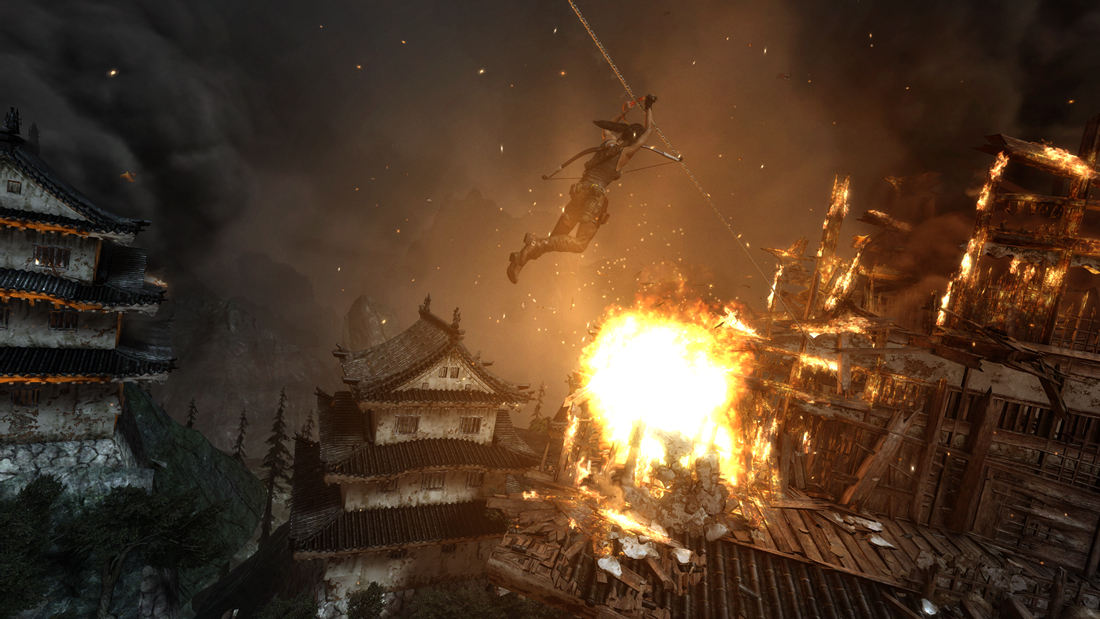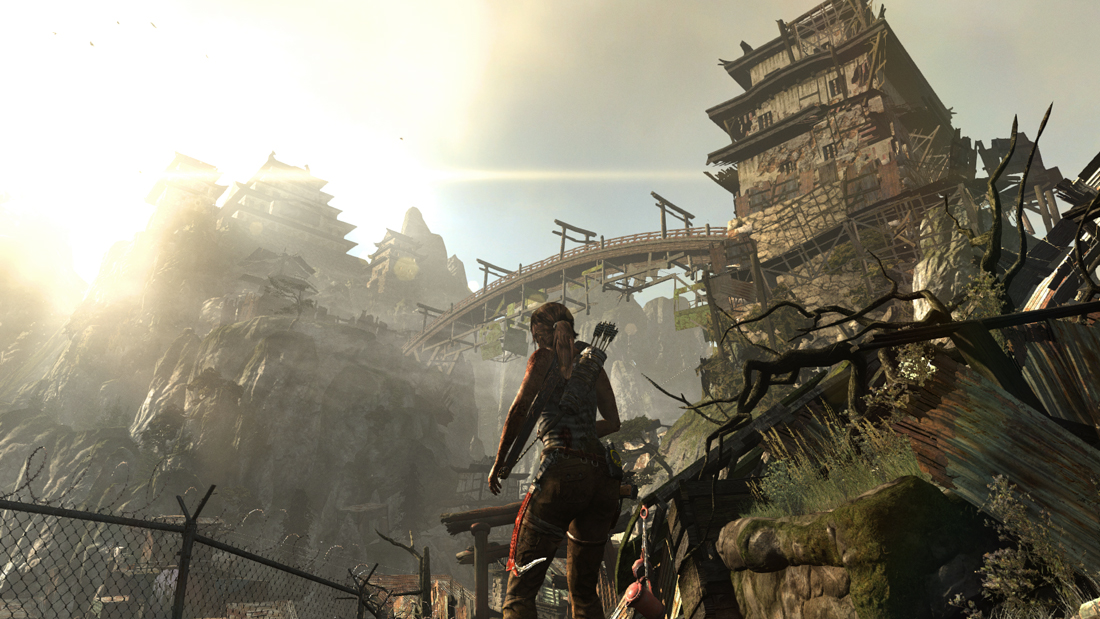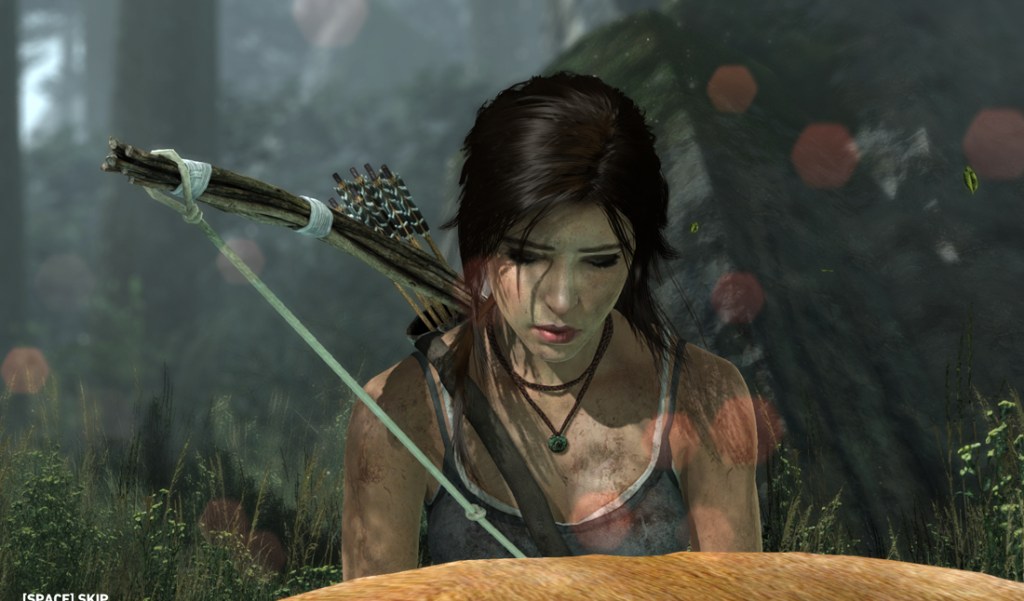[Review Update: 01/28/2014]
Hey good lookin'.
With 2013 behind us, next-generation Xbox and PlayStation consoles in our homes, and a little bit of extra cash to squeeze out of the latest Tomb Raider game, Square Enix and Crystal Dynamics have thrown everything they have at Lara Croft and come up with a damn gorgeous game. While extremely little has changed in Lara’s mechanics and transformation from naive college student to tomb-raiding badass, the graphics enhancements present in Tomb Raider: Definitive Edition do add to the experience in some subtle ways but don't alter the overall journey. We got hands-on with both Xbox One and PS4 versions to find out how things have changed.
Fresh off the boat, players will notice that Lara’s face and character model have gotten a new lease which can be jarring for anyone who has already completed Lara’s journey. While the original version seemed to feature a fresh-faced heroine with plenty of room for scars and numerous tribal tattoos, Crystal Dynamics have achieved more of a femme fatale look in the Definitive Edition. Less grad-student, more field work. Lara’s brow seems heavier, her eyes darker and smokier, and her hair bounces with the sheer force of a thousand daily shampoo rituals. Lara’s greatest weapon isn’t a blow drier. No, her bow remains one of the more satisfying weapons in gaming, but there is some doubt as to how much of Lara’s look needed to be changed.
The Definitive Edition probably gives us a good idea of where the developer might take the character next, but with inexperience driving this reboot, the revamped look didn’t exactly jive with my expectations. Regardless, environmental effects, increased texture fidelity, and an improved framerate make this new version of Tomb Raider worthy of your next-gen system. If you haven’t played the latest Lara Croft adventure, you have no excuse with either PS4 or Xbox One under your TV. The Definitive Edition even outperforms the PC version as trees, fog, and other foliage react to the gusty, unruly island atmosphere, always on the brink of a monsoon.
Between Xbox One and PlayStation 4, Tomb Raider: Definitive Edition performs better on PlayStation 4. This is another early win in the battle for third-party publishers as PS4 features a better framerate. Both Xbox and PlayStation versions run at 1080p, but you’ll definitively notice a smoother experience on Sony’s console. While playing the game through on Xbox One, scenes with lots of fire or other effects tend to slow the framerate below the normal plateau of 30 frames per second. On PlayStation 4, where the framerate typically sits around 60 frames per second, even intense, action-packed scenes remains smooth.
Tomb Raider was one of the best gaming experiences in 2013. It treated a character normally reserved for evidence that gaming is a childish and misogynistic hobby with respect and care, which left the player to head forward with dogged determination like only Lara Croft herself could muster. Multiplayer returns as well, but being a next-gen game won’t help the Definitive Edition’s online community. Crystal Dynamics might have thrown everything they had at improving the looks, but in the end it doesn’t improve on the already satisfying gameplay. Read our original review below for more on Tomb Raider.
[Original Review: 03/03/2013]
Men.
Pigs. Lazy, smelly, hairy, disgusting pigs. If it weren't for the women in our lives, we'd probably eat potato chips for dinner. In fact, if stranded on an island, we'd probably dedicate ourselves to waiting patiently for a woman to arrive and help us leave. At least, that's what you'd think, but the Scavengers who stumbled upon the mysterious, ancient island in the Dragon's Triangle, before the crew of the Endurance, probably wish they never saw a woman again.
It's an odd thing to think when you consider Lara Croft's iconic status as a video game heroine. Young men have ogled her polygons for over 15 years, whether her games were worth playing or not. Still, Crystal Dynamics and Square Enix have approached the timeless character in an incredibly modern way, redesigning her look and gameplay from the ground up. But does Tomb Raider draw too heavily from a half-tucked hero who's stolen her thunder?
I realize it's odd to start the review deriding my own gender, but our earliest look at Lara's new adventure was colored by the reaction to a suggestively violent encounter our heroine had with one of the Scavenger men who opposes her and her friends. This sequence arrives early in the game, maybe within the first two hours, which is odd considering Lara's reaction to violence and adversity in this harsh environment is about as black and white on either side of the "rape scene." In fact, my only major gripe with the game is that the promise of "Lara's transformation" into the adventurer we've come to know and love is largely forgotten after you fight off this brazen attacker.
That just leaves an unforgiving island, a few twists and turns, and mountains of dead bodies between Lara and her friend Sam who's been captured and taken for a sacrifice in an ancient ritual. It's all that killing that makes a mockery of the character's development. It's hard to take a life but Lara does, and soon, any man standing in her way will meet a violent end by arrow, bullet, explosion, or possibly a pickaxe to the skull.
Don't get me wrong, the combat is quite good. The shotgun is responsive and satisfying; the assault rifle is accurate in bursts; and the bow and arrow are an absolute delight to command against Lara's opponents. Snapping a headshot off and listening for that delicate smoosh of arrow-in-gray-matter is compelling and breathtaking whether you're eliminating an unsuspecting enemy from afar or firing rapidly at an aggressor.

Despite her stunted development over the campaign, you will grow fond of Lara, who's not just capable and agile, but smart as well. When one of Lara's show-boating, self-serving, egotistical male crew members sleazily meanders between sides, Lara's the only one to recognize it and mouth off at him. At first I thought Lara's cries of pain and grunts of exertion would get annoying, but Camilla Ludington's voice work is largely endearing (even if infrequent pronunciations butcher the English language like only slightly-racist haiku readings can).
Then Lara dies and the brutality strikes you. How could these men cut her throat, shoot her full of bullets and arrows, blow her up, throw her off a cliff, and impale her? Soon you're not killing because the game makes you. You're killing because you want Lara to survive. Tomb Raider draws the player in with gorgeous fidelity and actionand makes you care about a character that seemed so two-dimensional (or not) in the past. (As a short aside, yes, I'm a male gamer so I'm not going to project myself into the extremely feminine figure on my screen, OK?)
On her way off the island, Lara can explore large, open areas filled with secret collectibles and hidden tombs. Discovering one of these puzzling tombs isn't a major distraction in the game, but it helps to measure the pace through the more open-ended levels. Maybe you just unlocked some upgrade or a new piece of gear. Double back before moving on and open one of these tombs for rewards and light environmental puzzles, none of which are particularly challenging. That said, they serve to break up all the killing Lara does, allowing the combat room to breathe and stay fresh.
Lara scales mountains and radio towers, plunders ships in a narrow escape before they sink, unearths centuries-old treasures—all while leaping across impossible gaps, sliding down perilous slopes, and zip-lining over deep canyons. And then there's multiplayer.
Tomb Raider suffers the common mistake of tacked-on multiplayer. All those killing machines from single-player like the bow and arrow and grenades return in competitive modes, but because they retain their power and finesse, you'll likely spend more time looking at a spawn counter than you will fragging your friends. Players hungry for achievements and more of Lara's combat mechanics will find plenty of entertainment so long as the community holds up, but this is hardly worth your time. Luckily, the single-player campaign features enough adventure for the asking price.
I also wish the rest of the cast were more convincing and fleshed out. You can collect hidden records of Japanese soldiers or previous sacrificial offerings and find more entertaining and believable characters in the decades-old documents than you can in Lara's survivor friends. It can feel like there's a bit too much collecting to do, but focusing on the driving force and leaving the knickknacks for after the credits helps to even things out.

The skill trees and weapon upgrades aren't very compelling, either. You can reinforce your axe or tech out your bow with explosive arrows, but it feels completely unnecessary in the early game. Stealth and smart use of melee and cover can completely negate the need for these enhancements as well. I also wish the second-to-last boss fight was more than just a bullet sponge, but the final boss cements the fact that Lara is back and more entertaining than ever.
Regardless of these small nitpicks, Lara Croft is a welcome sight whether she shoots first and asks questions later—or not. Who needs a judge and jury when the crime of being a man is as plain as day? I thought Lara's vendetta against the unshaven inhabitants would serve to progressively develop her as a character. In the end, Lara is more measured and relatable, but any sense of feminism starts and stops with a gunshot.
Crystal Dynamics and Square Enix had an undeniably heavy burden in modernizing a character born from an immature, male-oriented fantasy, but no matter your gender, if you're a gamer, you should play Tomb Raider. It combines high-levels of interactivity, excellent pacing, and a true bond between the player and the character on screen. The game might ask you to suspend your disbelief from time to time, but at least it's not for Lara's measurements.
-
Lara Croft, Tomb Raider
-
Platforming and traversal gameplay
-
Tight third-person shooting and combat
-
Hidden Tombs!
-
Lack of real character development
-
Tacked-on, passable multiplayer
-
Stories discovered in collectibles
-
Pacing and variation in gameplay
-
Letting Lara die
-
KILL ALL THE MEN







